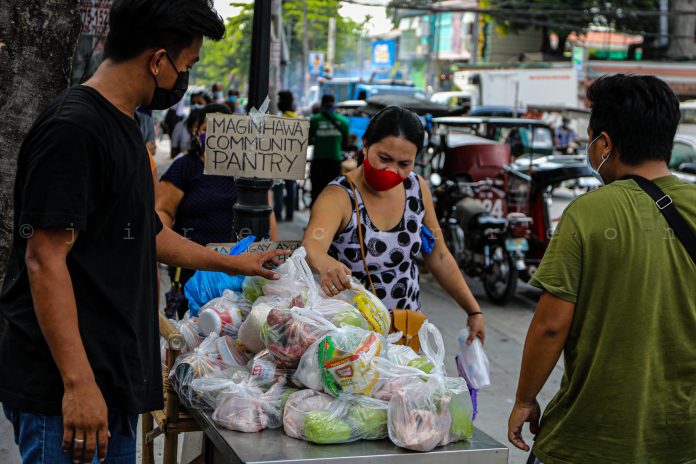Reflection for the 32nd Sunday in Ordinary Time (Cycle B)
Pride and hypocrisy are perhaps the biggest obstacles we have to overcome in ourselves if we wish to become capable of a genuine charity that leads to true justice and peace.
We must admit that we cannot demonstrate a supernatural charity founded on an unconditional selflessness embodying a praxis of simple sharing, if we cannot first admit that we need to transform our own selves before anything else: The act of giving presupposes no other motive but the intention of simply sharing what one has received, borne out of compassion for the inadequacies of and imperfections and pains shared with another.
Genuine charity is enabled only through a long process of conversion which awakens in us the reality of the commonness of our human condition; of the misery of human fate engendered by itself; and of the hope we can all still have in a glorious human destiny, consequently moving us to cry along with the victims who are being left behind. Genuine charity is thus founded only on humility and truth.
On the other hand, pride and hypocrisy produces a false and deceptive charity. Pride is about misbelieving in an image of ourselves which we don’t know to be true, but which we socially display anyway for self-preservation and self-interest; while hypocrisy is about projecting an image of ourselves which we know to be false, while secretly doing something else in clear contradiction to it, which we can always rationalize also for self-preservation and self-interest. Hence, their spurious acts of giving are only motivated by what one expects to receive in return, not by any intention to share nor by any feeling of compassion.
In fact, a charity inspired by pride and hypocrisy can be so deceiving that it will never admit to its private conditions for “sufficient and deserving” reciprocation, but will firmly insist that “it is compassionate” and that “it simply wants to share.” Pride and hypocrisy typically fabricate lies about its own questionable modesty, because we refuse to live with the truth of who we really are.
In Jesus’ time, hypocrites oppress orphans and widows while reciting lengthy prayers; the Christ warns “they will receive a very severe condemnation.” In our time, are we not allowing sinful social structures to thrive and maintain inequalities between the advantaged and disadvantaged, while remaining indifferent and focusing only on our individual sanctification? Are we not claiming to be a decent and civilized humanity, capable of deeming ourselves as “more deserving” while rejecting others as “undeserving?” Are we not also worthy of “a very severe condemnation?”
The ultimate test of sincerity and humility, or pride and hypocrisy, may be observed not in the magnitude with which one gives, but in the magnitude which remains. We are proud when we can give so much, but we are also hypocritical when what we gave came only from what we had in excess; yet we are humble when we can give out of our own neediness or willingness to live with less, but we are also sincere when we give out of love and a desire to alleviate the neediness of others. We are impelled to a genuine charity when we have experienced what it is like to lack something and to suffer for it; when we have experienced what it is like to be liberated from that suffering, we will be moved to give not only what we think we can afford, but what we believe is appropriate and necessary to relieve that same suffering in others.
More blessed are those who in spite of still being unliberated from suffering, have chosen to free others first before themselves. Most blessed are those who have chosen to give up themselves entirely to suffering and to die if needed, so that others may live; they are those who have chosen to follow the way of the Christ who after having received the love of the Father, responded with love for the Father and for all others whom the Father also loves, thereby actuating a self-oblation for those who were but should not be left behind. They are those who perfectly mirror the Spirit, who provides for the people at the peripheries such that “the jar of flour shall not go empty, nor the jug of oil run dry, until the day when the Lord sends rain upon the earth.”
We all professed to follow the Christ who offered his own Body and Blood in a singular sacrifice, to appeal before God in our behalf and to save us from the misdeeds of our pride and hypocrisy. May we all perform our priestly role – in spite of being imperfect and “undeserving” – in similarly offering ourselves in sacrifice, so that in preparation for the Parousia, we can join him in his ongoing mission “to bring salvation to those who eagerly await him.” May we all perform our prophetic role – with courage in the Truth – in proclaiming, “The Lord keeps faith forever: securing justice for the oppressed; giving food to the hungry; setting captives free; giving sight to the blind; raising up those who were bowed down; loving the just; protecting the strangers; sustaining widows and orphans; and thwarting the way of the wicked.”
Brother Jess Matias is a professed brother of the Secular Franciscan Order. He serves as minister of the St. Pio of Pietrelcina Fraternity at St. Francis of Assisi Parish in Mandaluyong City, coordinator of the Padre Pio Prayer Groups of the Capuchins in the Philippines and prison counselor and catechist for the Bureau of Jail Management and Penology.
The views expressed in this article are the opinions of the author and do not necessarily reflect the editorial stance of LiCAS.news.









